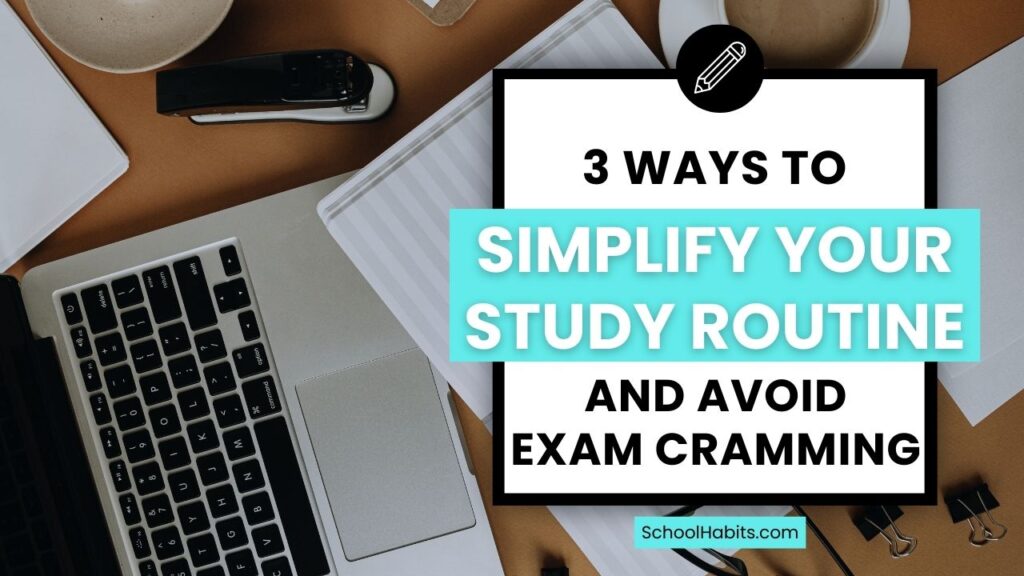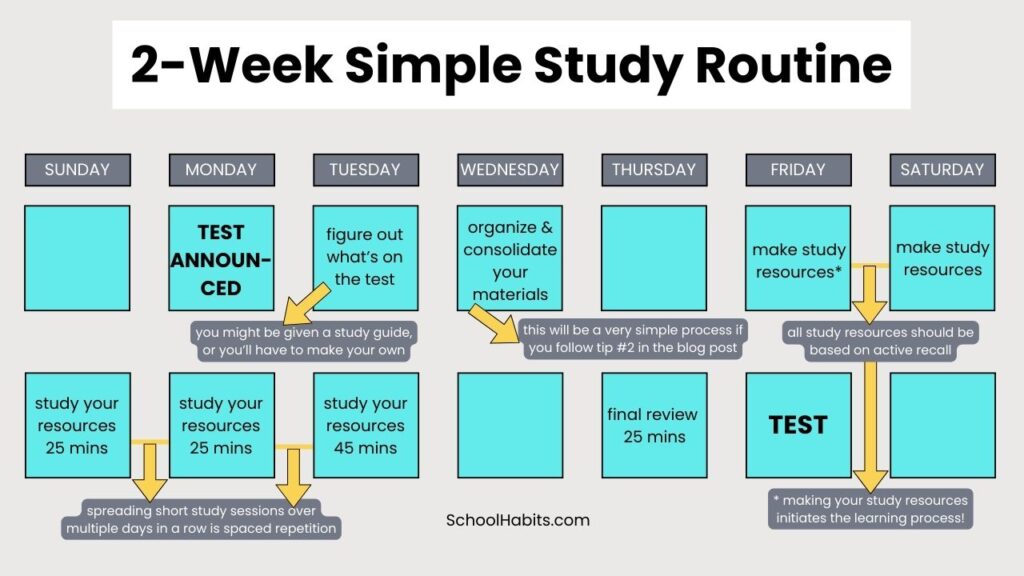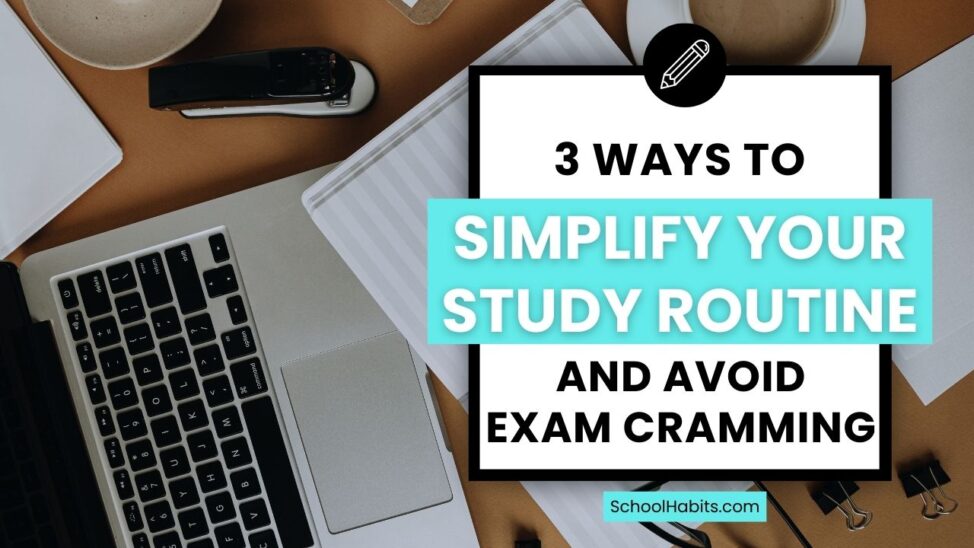
By Katie Azevedo, M.Ed.
At some point or another, all students will find themselves cramming for a test. Whether it’s bad time management or simply more tasks than time, these things sometimes just happen.
But that’s not the goal. The goal is to do better. The goal is to create some systems and strategies to reduce the last-minute study and stress chaos that often comes before tests and exams.
In this blog post, I’m sharing 3 ways to simplify your study routines to reduce exam cramming. If you put these strategies in place now, you can significantly decrease your stress and study time before tests.
3 Ways to Simplify Your Study Routine to Reduce Exam Cramming
Before we begin, I highly recommend watching my video called How to Study Less. (I have a blog post too, if you’d rather read it.) In the tutorial, I share the number one strategy that will reduce your study time so dang much. You certainly need to watch the full tutorial, but here’s the gist: the key to studying less is to learn the material along the way (I explain in the video).
The following three strategies will help you learn the material you’re being taught. They will decrease how much you need to prepare for exams and simplify your overall study routine.
1. Make Study Materials From Your Notes Throughout the Unit
Many students will make one or both of the following study mistakes:
- Thinking that reading their notes counts as studying (this is false, as reading is not studying; studying involves doing something with the material)
- Making study materials and studying those materials in the same study session (this leads to exam cramming, which we are trying to avoid)
Instead, the way to simplify your study routine is to make your study resources gradually as you learn the material. This is a very simple process if you take notes that are easy to turn into study materials. (That link goes to my blog post about taking notes that are easy to turn in to study materials. If you prefer video, I also have a YouTube video about it.)
Then, once your test is announced or you get close to the test date, you can begin to test yourself using the study materials you made.
Making your study materials from your notes over the course of the unit (instead of all at the end, right before a test) has two incredible benefits:
- You learn the content deeper and better, as making study materials involves thinking and writing about the content (so you’re using spaced repetition) (LINK)
- You free up time during your study sessions to use the study materials you made (for example, testing yourself using the flashcards you made during the prior few weeks)
To get a better idea of how this might work for a two-week unit, see the image below. I’ve outlined a basic hypothetical plan for making your study materials gradually before a test.

PS: If you’re a college student and you have a weekly no-class day, making your study materials is one of the 5 tips I suggest in this post about maximizing your class-free day.
2. Organize Your Materials into Study Packets
Throughout a unit, you’re going to collect a lot of materials related to what you’re learning. This includes worksheets, PDFs, handouts, readings, problem sets, notes, and quizzes. As you accumulate these papers and digital files, it’s a good idea to keep them organized and grouped together.
Most of us think about organizing our school papers and files in a way that is neat and tidy. We think it doesn’t matter if our papers are out of order as long as they’re neatly tucked into folders and binders. But I want to encourage you to change that line of thinking.
When we change how we think about organizing our papers, we simplify our study routine and become better prepared for exams.
Here’s what I suggest: Start grouping papers by unit. So instead of tucking a returned biology quiz randomly into your biology folder, group it with other materials from that unit that would be helpful to study from. Essentially you would start forming a “study packet” throughout a unit. This study packet will become a resource to use when you make your study materials for the test or exam.
Here’s the catch: Only the best materials go into your study packet. This includes returned quizzes and tests, problem sets, your best notes, practice worksheets, and other materials from which you could pull questions and content to make active recall study materials.
Pro Tip: Have you heard of a personal operating system? It can make everything I’m teaching you in this post SO much easier to implement. Find out what it is and why every student needs one.
3. Make a Cheat Sheet
Making a cheat sheet of the most important content you’re learning is an awesome way to simplify your study routine and reduce exam cramming. I teach you a step-by-step process for making a cheat sheet in this video and in this blog post. When you’re done here, head to the video or the blog post to learn more about this underappreciated study method.
A cheat sheet is a one-page reference sheet you gradually make, add to, and refine throughout a unit.
Cheat sheets are secret weapons because:
- they help you learn your content because the process of making and refining your cheat sheet for several days or weeks IS the learning process
- they become super valuable reference materials when you’re doing your homework or completing your assignments
Remember, I’m teaching you three ways to simplify your study routine to reduce exam cramming. And the strategy of making a cheat sheet does exactly that.
When you make a cheat sheet gradually, without the stress of last-minute, way-too-long chaotic study sessions, you allow yourself to truly learn the material instead of forcing your brain to memorize it in a high-stakes situation. Memorizing is not learning. Memorizing is stressful and it’s temporary. Learning something is actually the easier route. Truly learning your material IS the ultimate study hack.
- Note: If you’re looking for a simple routine to reduce school stress (without more work), go here.
- If you’re ready for 5 more ways to make studying easier, go here.

